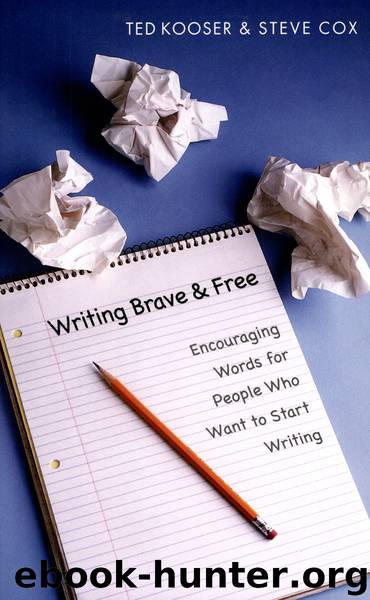Writing Brave and Free by Steve Cox

Author:Steve Cox [Kooser, Ted; Cox, Steve]
Language: eng
Format: epub
ISBN: 978-0-8032-7696-3
Publisher: UNP - Nebraska
Published: 2014-04-05T04:00:00+00:00
If you want to practice getting at the core of a sensation, feeling, or thought and want to write lots of poems very fast, haikus may serve you well.
If you’re writing love poems, you may gravitate toward sonnets. A sonnet is a little song, long enough to express your feelings yet not so long as to bore the object of your affection. Shakespeare used sonnets to write about his thoughts on cosmic themes as well as his immediate feelings, and his sonnets are always fourteen lines long, rhymed in a fairly strict pattern. Sonnets of his day applied a sort of dialectical budget: thesis (six lines), antithesis (six lines), synthesis (two lines). Or the first eight lines stated a problem and the last six resolved it. Or the first four lines were the beginning, the next six were the middle, and the. last four were the end. Or the first twelve lines were the beginning, the last two lines the ending, and there wasn’t any middle. Shakespeare himself seemed to try to start off with a boffo lead, give lots of interesting details in the middle, and end his poems with a bang.
As we’ve mentioned again and again, one of the pleasures of writing is the craft of it, shaping your sensations, feelings, and thoughts into a form that readers will find pleasing, too. Writing in strict forms, such as that of the Shakespearean sonnet, can be very satisfying, and a good way to learn, too. Any piece of writing that you have enjoyed reading is likely to be a good deal more than merely a shapeless blob of self-indulgent meandering. The writer has put it in some form, although it maybe more subtle than the rhymed sonnets that Shakespeare favored.
An epic poem is usually very long—so long that Alfred, Lord Tennyson never completed his, and Edmund Spenser scarcely got past the introduction of his epic, The Faerie Queene. An epic is the work of a lifetime, and if you’re writing one you needn’t worry about the middle or the end, because you’re unlikely to get there.
A book, librarians say, is a piece of writing more than one hundred pages long. After reading the critical opinions of lots of book reviewers, the writer Randall Jarrell concluded that a novel is a long piece of fiction that has something wrong with it. Being books, novels have to be at least one hundred pages long. Beyond that, the sky is the limit, and it’s even ok to make some mistakes.
Your imaginary reader or listener, and how you plan to publish your work, will certainly affect the size and scope of what you’re writing.
Magazines nowadays want articles shorter than fifteen hundred words—that is, four and a half double-spaced pages in 11-point type. Readers today have a short attention span and magazines prefer to publish short pieces. (More important, short articles leave more space for the publisher to sell as ads.) A pundit’s column on the editorial page of a newspaper runs about 750 words—less than two double-spaced pages in 11-point type.
Download
This site does not store any files on its server. We only index and link to content provided by other sites. Please contact the content providers to delete copyright contents if any and email us, we'll remove relevant links or contents immediately.
Asking the Right Questions: A Guide to Critical Thinking by M. Neil Browne & Stuart M. Keeley(5751)
Autoboyography by Christina Lauren(5223)
Eat That Frog! by Brian Tracy(4518)
Dialogue by Robert McKee(4385)
Sticky Fingers by Joe Hagan(4186)
Journeys Out of the Body by Robert Monroe(3610)
Annapurna by Maurice Herzog(3463)
Full Circle by Michael Palin(3443)
Schaum's Quick Guide to Writing Great Short Stories by Margaret Lucke(3368)
Elements of Style 2017 by Richard De A'Morelli(3336)
The Art of Dramatic Writing: Its Basis in the Creative Interpretation of Human Motives by Egri Lajos(3058)
Atlas Obscura by Joshua Foer(2948)
Why I Write by George Orwell(2944)
The Diviners by Libba Bray(2927)
The Fight by Norman Mailer(2924)
In Patagonia by Bruce Chatwin(2919)
The Mental Game of Writing: How to Overcome Obstacles, Stay Creative and Productive, and Free Your Mind for Success by James Scott Bell(2896)
Venice by Jan Morris(2568)
The Elements of Style by William Strunk and E. B. White(2469)
